Audi Q4 e-tron vs VW Tiguan - Differences and prices compared
Compare performance (340 HP vs 272 HP), boot space and price (39600 £ vs 33300 £ ) at a glance. Find out which car is the better choice for you – Audi Q4 e-tron or VW Tiguan?
Costs and Efficiency:
Price and efficiency are often the first things buyers look at. Here it becomes clear which model has the long-term edge – whether at the pump, the plug, or in purchase price.
VW Tiguan has a to a small extent advantage in terms of price – it starts at 33300 £ , while the Audi Q4 e-tron costs 39600 £ . That’s a price difference of around 6257 £.
As for electric range, the Audi Q4 e-tron performs significantly better – achieving up to 554 km, about 428 km more than the VW Tiguan.
Engine and Performance:
Power, torque and acceleration are the classic benchmarks for car enthusiasts – and here, some clear differences start to show.
When it comes to engine power, the Audi Q4 e-tron has a to a small extent edge – offering 340 HP compared to 272 HP. That’s roughly 68 HP more horsepower.
In acceleration from 0 to 100 km/h, the Audi Q4 e-tron is hardly perceptible quicker – completing the sprint in 5.40 s, while the VW Tiguan takes 5.90 s. That’s about 0.50 s faster.
In terms of top speed, the VW Tiguan performs clearly perceptible better – reaching 242 km/h, while the Audi Q4 e-tron tops out at 180 km/h. The difference is around 62 km/h.
There’s also a difference in torque: Audi Q4 e-tron pulls clearly stronger with 679 Nm compared to 400 Nm. That’s about 279 Nm difference.
Space and Everyday Use:
Whether family car or daily driver – which one offers more room, flexibility and comfort?
Both vehicles offer seating for 5 people.
In curb weight, VW Tiguan is distinct lighter – 1599 kg compared to 2035 kg. The difference is around 436 kg.
In terms of boot space, the VW Tiguan offers slightly more room – 652 L compared to 535 L. That’s a difference of about 117 L.
In maximum load capacity, the VW Tiguan performs minimal better – up to 1650 L, which is about 160 L more than the Audi Q4 e-tron.
When it comes to payload, VW Tiguan barely noticeable takes the win – 533 kg compared to 515 kg. That’s a difference of about 18 kg.
Who wins the race in the data check?
The Audi Q4 e-tron sits well ahead of its rival in the objective data comparison.
This result only shows which model scores more points on paper – not which of the two cars feels right for you.
Costs and Consumption
View detailed analysis
Engine and Performance
View detailed analysis
Dimensions and Body
View detailed analysis
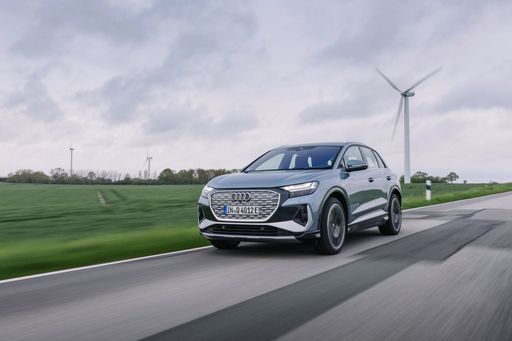
Audi Q4 e-tron
Audi Q4 e-tron
The Audi Q4 e-tron brings Audi polish into the electric crossover scene, pairing a sleek exterior with a refined, airy interior that makes everyday driving feel distinctly premium. It’s an easy-to-live-with EV that balances comfort and real-world usability with intuitive tech, making it a smart choice for buyers who want electric mobility without giving up Audi character — and yes, it still looks good in the driveway.
details
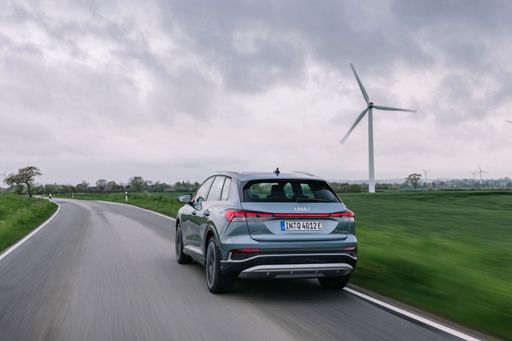
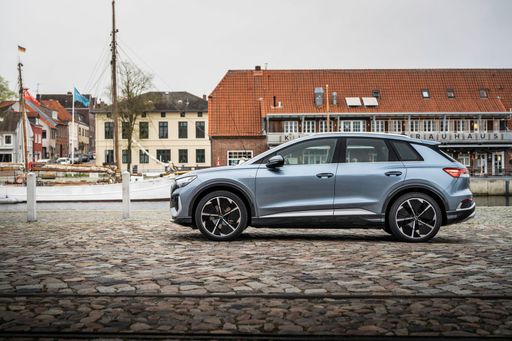
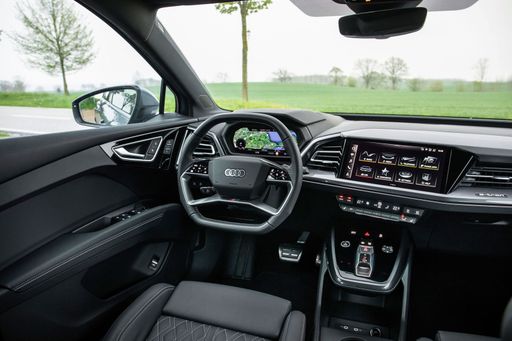
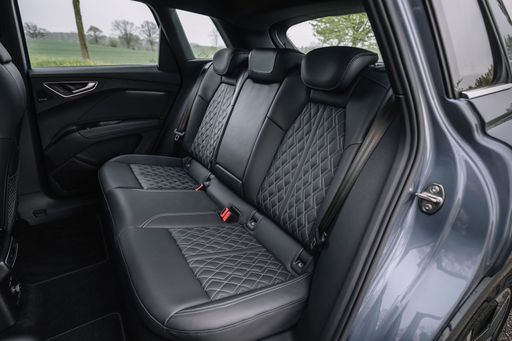
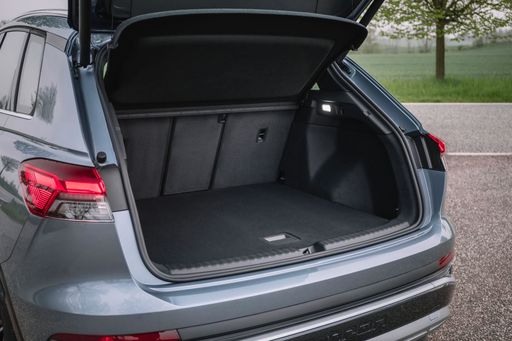
VW Tiguan
The VW Tiguan blends sensible family practicality with a dash of German polish, delivering a calm, reassuring ride and a cabin that never feels like an afterthought. For buyers who want an SUV that’s easy to live with yet still nicely dressed, the Tiguan is the grown‑up choice that keeps a cheeky wink in reserve.
details





Costs and Consumption |
|
|---|---|
|
Price
39600 - 58800 £
|
Price
33300 - 51900 £
|
|
Consumption L/100km
-
|
Consumption L/100km
1.4 - 8.4 L
|
|
Consumption kWh/100km
15.9 - 17.4 kWh
|
Consumption kWh/100km
-
|
|
Electric Range
406 - 554 km
|
Electric Range
118 - 126 km
|
|
Battery Capacity
59 - 77 kWh
|
Battery Capacity
19.70 kWh
|
|
co2
0 g/km
|
co2
32 - 190 g/km
|
|
Fuel tank capacity
-
|
Fuel tank capacity
45 - 58 L
|
Dimensions and Body |
|
|---|---|
|
Body Type
SUV
|
Body Type
SUV
|
|
Seats
5
|
Seats
5
|
|
Doors
5
|
Doors
5
|
|
Curb weight
2035 - 2235 kg
|
Curb weight
1599 - 1890 kg
|
|
Trunk capacity
520 - 535 L
|
Trunk capacity
490 - 652 L
|
|
Length
4588 mm
|
Length
4539 mm
|
|
Width
1865 mm
|
Width
1842 - 1859 mm
|
|
Height
1614 - 1632 mm
|
Height
1656 - 1658 mm
|
|
Max trunk capacity
1460 - 1490 L
|
Max trunk capacity
1486 - 1650 L
|
|
Payload
505 - 515 kg
|
Payload
460 - 533 kg
|
Engine and Performance |
|
|---|---|
|
Engine Type
Electric
|
Engine Type
Petrol, Petrol MHEV, Diesel, Plugin Hybrid
|
|
Transmission
Automatic
|
Transmission
Automatic
|
|
Transmission Detail
Reduction Gearbox
|
Transmission Detail
Dual-Clutch Automatic
|
|
Drive Type
Rear-Wheel Drive, All-Wheel Drive
|
Drive Type
All-Wheel Drive, Front-Wheel Drive
|
|
Power HP
204 - 340 HP
|
Power HP
130 - 272 HP
|
|
Acceleration 0-100km/h
5.4 - 8.1 s
|
Acceleration 0-100km/h
5.9 - 10.6 s
|
|
Max Speed
160 - 180 km/h
|
Max Speed
210 - 242 km/h
|
|
Torque
310 - 679 Nm
|
Torque
220 - 400 Nm
|
|
Number of Cylinders
-
|
Number of Cylinders
4
|
|
Power kW
150 - 250 kW
|
Power kW
96 - 200 kW
|
|
Engine capacity
-
|
Engine capacity
1498 - 1984 cm3
|
General |
|
|---|---|
|
Model Year
2023 - 2025
|
Model Year
2024 - 2025
|
|
CO2 Efficiency Class
A
|
CO2 Efficiency Class
G, D, E, F, B
|
|
Brand
Audi
|
Brand
VW
|
What drive types are available for the Audi Q4 e-tron?
The Audi Q4 e-tron is offered with Rear-Wheel Drive or All-Wheel Drive.




